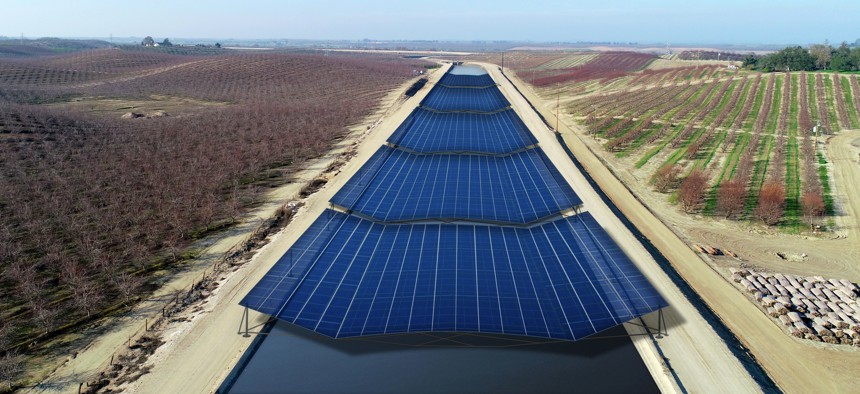There's a Deal to Conserve the Colorado River, Now Comes the Hard Part

Courtesy of Solar AquaGrid
After two decades of an ongoing “mega drought” in the West, there are a variety of water conservation efforts to choose from. But one idea in California sticks out.
Arizona, California and Nevada agreed last week to voluntarily conserve 3 million acre-feet of water through 2026 from the stressed Colorado River, which supplies water to 40 million people.
In exchange for the states agreeing to reduce their usage by an unprecedented amount—just short of one-third of the river’s average annual flow—the Biden administration will pay them $1.2 billion.
Once approved, though, the real challenge will be deciding how to conserve that water. After two decades of working to alleviate the effects of the ongoing “megadrought” in the West, there are a variety of efforts to choose from.
For years now, cities in Nevada and Arizona have banned water-hungry grass lawns in subdivision entrances, road medians and outside businesses where the grass serves no purpose other than decoration. More recently, Nevada enacted size limits on some swimming pools.
And there’s an experiment in California to capture a significant amount of water by controlling the intensity of forest fires. In order to give fires less fuel to burn through, California is strategically cutting down trees. Trees absorb a lot of water, and a project is looking to capture that water and direct it to streams that benefit cities and towns.
Newer innovations that help prevent evaporation, such as high density black plastic shade balls, are also promising.
The installation of solar arrays over much of California’s 4,000 miles of canals might become one of those innovations, if a pilot program called Project Nexus, which is set to begin in the fall, yields good results.
Eventually, the idea is to cover most of the canals in California and to scale the project to cover other canals throughout the West, said Roger Bales, an engineering professor at the University of California, Merced, who is the lead author on a study in the journal Nature Sustainability that evaluated the feasibility of the solar arrays over canals. California’s open-air agricultural canals move water to farmland and to aqueducts that supply drinking water to homes and businesses in the state. It’s the world’s largest conveyance system of water, Bales said.
If all the canals are covered in California, Bales said, then it could reduce evaporation by 90 percent and it could save 63 billion gallons or more of water annually—enough to irrigate around 50,000 acres of farmland or meet the residential needs of more than 2 million people.
In India, where the idea of installing solar panels over canals was first put into use, the arrays not only keep the water cool and prevent most evaporation, but the shade they cast also cuts down on the growth of algae—which blocks sprinklers for the crops and affects water quality—and on aquatic weeds. The weeds interfere with equipment that controls the flow of water in the canals, said Josh M. Weimer, external affairs manager for the Turlock Irrigation District, which operates the canals where the pilot project will take place. “Aquatic weed growth is a huge annual expense for the water utilities,” he said. “We spend about $1 million a year to clear our canal systems.”
The canal project is a partnership between the state department of water resources, which is paying $20 million for the pilot, the Turlock Irrigation District, which will also recover the energy produced by the solar arrays, Solar AquaGrid, a private developer, and the University of California, Merced.
Project Nexus, in the state’s Central Valley, will place solar panels over a one-mile stretch of 20-25-foot wide canals and nearly another mile of panels on a 110-foot wide canal. The experiment on the wider canal will provide data that will be useful for future plans to cover drinking water aqueducts, which are broader than agricultural canals.
The data yielded by the pilot project is expected to help create a plan, along with projected costs, to bring the project to scale, said Robin Raj, co-founder and CCO of Solar AquaGrid, which created the pilot project. “This is a very bespoke project so we can test different widths.”
Among the solar array project’s benefits is the production of clean energy. The energy generated is estimated to reach one-sixth of the state’s current capacity—or roughly half the projected new capacity needed by 2030, according to Solar AquaGrid’s website.
“This is the first project,” Bales said. “A lot goes into the design and research so we can scale it out. We don’t have a price for the 4,000 miles.”
That price to benefit ratio will be important for irrigation districts to commit to adding more solar panels. The Turlock Irrigation District owns 250 miles of canals and is publicly owned, so the cost to scale the project beyond the pilot project will be passed on to consumers. “We’re also an electric provider, so it makes a lot of sense for us to try this,” Weimer said. “The concept could have far-reaching implications.”
Not all irrigation districts are set up as ideally as Turlock to take advantage of both the water savings and the production of clean energy. “Turlock is one of four water and energy providers in California. That’s what made them a perfect place to begin. Their transmission lines are extraordinarily close to the canals,” Raj said. “It could be more expensive in other districts” to move the energy produced by the solar panels.
There is yet another benefit to running solar panels along the canals rather than mounting them on the ground, Raj said. By running them on the canals, there’s no need to buy land and it should be faster and easier to obtain permits because the canals are “previously disturbed land … there’s more bang for the buck than ground-mounted solar.”





